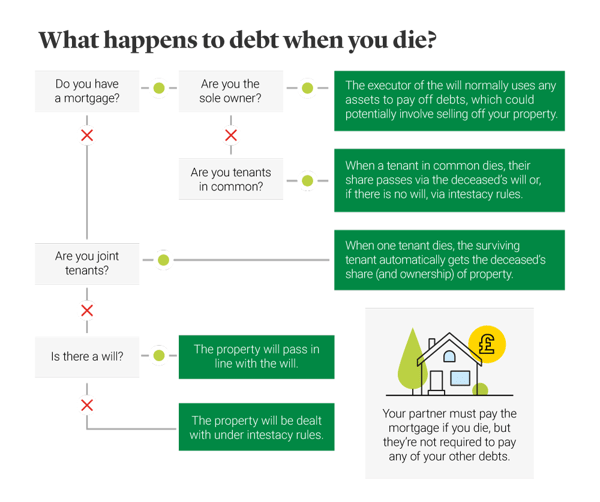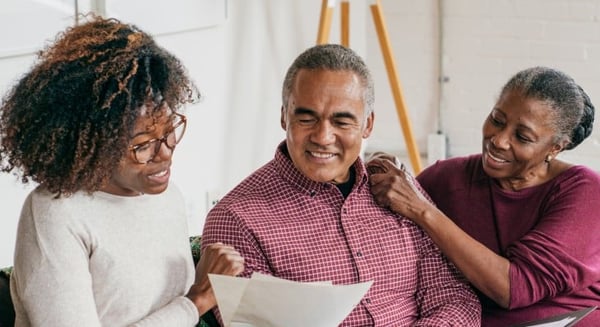What happens to someone's debts when they die
When someone dies, their estate is responsible for any debts. This means that any outstanding debts will usually be repaid using money or property remaining in the estate.

You may also be interested in...
Debt after death: the key points
Dealing with the debts of a deceased person presents a challenge for any family or individual. Below, you can find key information and learn more about what happens to debt after someone had died:
- What happens to debts when someone dies?
- Are families responsible for debt after death?
- Do credit card debts die with you?
- Sorting out the debts of someone who has died
- How to deal with debts as the executor
- Dealing with debt if there is no insurance
- Joint debts
- Undisclosed debts
- Secured and unsecured debts
- What to do if there’s not enough money

Sorting out the debts of someone who has died
In the aftermath of a death, it can of course be difficult to move on to practical tasks. So when it comes to dealing with a deceased person’s debts, it can be useful to have a priority order. Once you’ve received a Grant of Probate or Letters of Administration, here are some first steps you could take:
How to deal with debts as the executor
As the executor of the estate, here are some practical steps you can take – and issues to consider – to make sure the deceased’s debts are taken care of.
- Contact creditors and explain the situation, asking them to send a statement outlining anything still owed.
- Make sure that in the case of an individual debt, like a credit card debt, the bank immediately stops taking any scheduled Direct Debits from the deceased’s bank account.
- Note that in the case of a joint bank account, the surviving partner becomes the sole owner of the account, and remains responsible for any debts.
- If it is a joint debt, then the name of the deceased can be removed from the debt.
- With any luck, the deceased will have put all the relevant documents together – including insurance policies – and will have let someone know where they are, or even included such details in their estate plan.
- Remember to check paper records, computers, memory sticks, and cloud-based storage for digital versions of documents.
Dealing with debt if there is no insurance
If there is no insurance in place, what happens to debt when someone dies? The executor of the will should contact the creditors to make arrangements to pay off the debts, assuming they haven’t already made a claim on the estate.
If there is no life policy to cover the mortgage, and the beneficiaries named in the will – or under the rules of intestacy – have no wish to obtain, or do not qualify for, a mortgage, then the property may be sold to cover the outstanding debt.
Types of debt when someone has died
Once the Personal Representative of the will has probate, or grant of administration, the money from the deceased’s estate can be used to pay off any outstanding debts. But first, you’ll want to understand what types of debt you’re dealing with.
How to pay off someone's secured and unsecured debts
If someone has passed away and you’ve been tasked with managing the estate, there are different ways you might tackle each secured or unsecured debt.
Mortgages
When it comes to the deceased’s mortgage, the lender still has the right to demand that the mortgage is repaid in full. So as the executor, here are three steps you could follow:
- Find out if the deceased had a life insurance policy. If they do you could make a claim in order to pay off some or all of the mortgage.
- If there is no life insurance, decide whether you want to keep the property and take on the mortgage. You (and anyone else named in the will) have the right to transfer ownership to yourself.
- Alternatively, you can sell the property – known as a ‘probate sale’ – and use the proceeds to repay the lender. You will need to pay any Inheritance Tax due within six months.
Cars
Similarly, if the deceased has an unsecured car loan debt, you may decide to sell their vehicle in order to settle the outstanding balance. If the debt is secured, the car finance company may choose to auction the vehicle and claim any outstanding funds from the estate. You will also need to inform the DVLA when the registered car owner has died.
Loans
For unsecured debts like personal loans and credit card debts, here are some steps you can follow.
- Locate the original signed loan agreement to see if anyone other than the deceased is listed.
- Contact the deceased’s bank to settle the outstanding debts using money from the estate.
- Confirm that the payment has been processed so the bank can update its records.
It’s worth remembering that only the person who signed the credit agreement can be held personally liable for credit card debts, though the money will still need to be repaid by their estate.
Bills
As the executor you will be responsible for settling the deceased’s final utility bills such as water, gas and electricity. Here is how you can repay these debts.
- Inform each utilities company that the account holder is deceased and that you will be paying off the outstanding balance.
- Provide them with any required information, such as the most recent meter reading.
- Pay the final bill using money from the estate and ensure any Direct Debits are cancelled.





